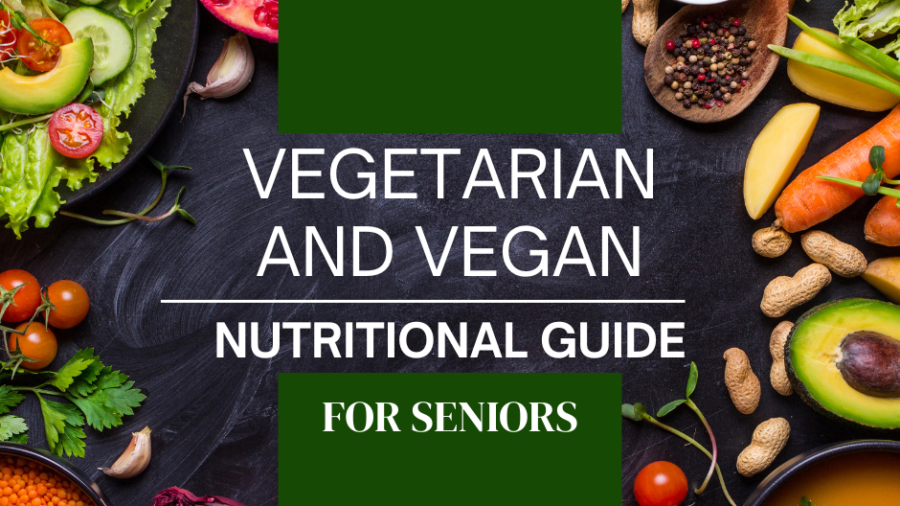In this guide, seniors and their caregivers can access important nutritional guidance that pertains exclusively to vegetarians and vegans. It includes information about the benefits of vegetarianism and veganism, as well as particular challenges and obstacles that seniors following this type of diet commonly face. Furthermore, this guide includes resources that may help seniors access healthy vegetarian and vegan foods when access is limited.
Health Benefits of Following a Vegan or Vegetarian Diet
There are many potential benefits of following a vegan or vegetarian diet, many of which are likely to appeal to older adults and senior citizens. While research on the subject is limited, people who follow vegetarian or vegan diets often report an increase in energy and cognitive function. Furthermore, the Academy of Nutrition and Dietetics has published research suggesting that such a diet may lead to better sleep, better immune function and a decreased risk of cancer, heart disease and type 2 diabetes.
In the table below, these potential benefits are further explained:
| Benefit | How a Vegan/Vegetarian Diet Helps |
| Increased energy | Because carbohydrates don’t take as long to digest as protein, vegans and vegetarians typically burn fewer calories while digesting their meals, resulting in a higher level of energy throughout the day. |
| Healthier skin | Vitamins and minerals that are commonly found in plant-based foods, including vitamin E and vitamin C, as well as other bioactive compounds like beta carotene and phenolic acids, can contribute to a healthier appearance, helping to make skin glow and reducing blemishes. |
| Lower stress | Some studies have suggested that a vegetarian diet may contribute to a healthier, happier mood thanks to long-chain omega-3 fatty acids. |
| Improved immunity | Biomarkers studied by several researchers suggest that vegetarian or vegan diets may reduce inflammation, which can result in improved immunity. |
| Improved cognitive function | Inflammation has been linked with cognitive impairment and because plant-based diets tend to reduce inflammation, researchers and doctors have begun studying the effect of vegetarianism on cognitive function. While these studies are limited, results thus far suggest that a plant-based diet may be beneficial for seniors struggling with cognitive impairment. |
| Improved sleep and mood | Vegetarian and vegan diets may help seniors to increase their serotonin production, as well as regulate melatonin levels, resulting in improved sleep and mood. |
| Decreased risk of disease | As mentioned earlier, studies have shown that veganism and vegetarianism are thought to decrease the risk of chronic illnesses including cancer, type 2 diabetes and coronary heart disease. |
Challenges of Vegetarian and Vegan Diets and Solutions
While the benefits of a vegan or vegetarian diet are plentiful, there are downsides to eliminating meat and/or other animal byproducts entirely. Most notably, these include limited access to a variety of plant-based foods, as well as issues with nutrient deficiencies.
The challenges that seniors most frequently face when following vegetarian or vegan diets are outlined below.
Access to Food Options
Although grocery chains and restaurants are becoming more mindful of customers who consume plant-based foods exclusively, access to animal-free foods can be limited, especially for seniors who live in remote areas. This same issue is common among seniors who live in continuing care homes such as nursing homes and assisted living facilities, as well as those who choose to dine with family members either at home or in restaurants.
Unfortunately, the lack of options can often result in seniors resorting to eating dinners without sufficient protein, which is a vital part of a balanced diet.
Nutrient Deficiencies
Meat often contains important nutrients, including protein, which is responsible for building and maintaining lean muscle, as well as iron and vitamin B12. Without ample protein in a senior’s diet, they may face issues with strength, metabolism and energy levels. Thankfully, the inclusion of plant-based protein in one’s diet can combat these barriers to optimal health in vegan and vegetarian seniors.
Overcoming Nutritional Challenges
While the challenges of following a vegan or vegetarian diet can feel overwhelming for seniors, particularly when it comes to trying to socialize with friends and family who don’t follow the same diet, there are ways to overcome them.
Seniors who are entering long-term care should consider discussing their dietary restrictions with homes prior to signing any contract or moving into a new facility. Many long-term care homes offer various plant-based options for residents, with some providing multiple choices at every meal. Some communities may provide more options than others, so it’s worth doing your research.
Additionally, including a broad range of high-protein foods, like beans and legumes, plant-based meat alternatives and tofu, can help seniors avoid health problems and nutrient deficiencies related to their diet.
Getting Started on a Plant-Based Diet
Seniors who may be interested in switching to a vegan or vegetarian diet may find the potential health benefits of doing so appealing. Others may consider switching their diet to align with their own beliefs and morals. Regardless of the reason, there are some steps that should be followed prior to making any dramatic changes to one’s diet.
- Talk to your healthcare provider: Dietary changes can be difficult on the digestive system and on the body in general. That’s why it’s important to consult a physician or another healthcare provider who can provide guidance and oversee the change.
- Meet with a registered dietician: A dietician can help new vegans and vegetarians develop meal plans that include adequate protein, vitamins and minerals.
- Go slowly: Because of the stress the digestive system is likely to go through when undergoing a major dietary change, it’s important to take it slow. A gradual transition to eating less and less meat until it’s completely eliminated and eating more and more plant-based foods might work better for some seniors than becoming vegetarian or vegan in one day or week.
- Explore a variety of plant-based options: Plant-based proteins have been improved dramatically in recent years. Seniors should take time to try different brands of meat substitutes until they find something they like.
- Take supplements daily: Daily supplements, especially calcium, vitamin D, iron and vitamin B12 can help seniors maintain optimal health, especially when these elements are missing from their daily diet. Always check with your doctor before taking supplements, however, to make sure they won’t interfere with medications you’re taking.



Add a Comment